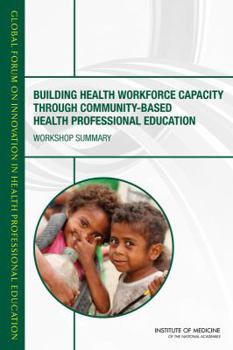Building Health Workforce Capacity Through Community-Based Health Professional Education: Workshop Summary
There is growing evidence from developed and developing countries that community-based approaches are effective in improving the health of individuals and populations. This is especially true when the social determinants of health are considered in the design of the community-based approach. With an aging population and an emphasis on health promotion, the United States is increasingly focusing on community-based health and health care. Preventing disease and promoting health calls for a holistic approach to health interventions that rely more heavily upon interprofessional collaborations. However, the financial and structural design of health professional education remains siloed and largely focused on academic health centers for training. Despite these challenges, there are good examples of interprofessional, community-based programs and curricula for educating health professionals. In May 2014, members of the Institute of Medicine's Global Forum on Innovation in Health Professional Education came together to substantively delve into issues affecting the scale-up and spread of health professional education in communities. Participants heard a wide variety of individual accounts from innovators about work they are undertaking and opportunities for education with communities. In presenting a variety of examples that range from student community service to computer modeling, the workshop aimed to stimulate discussions about how educators might better integrate education with practice in communities. Building Health Workforce Capacity Through Community-Based Health Professional Education summarizes the presentations and discussion of this event.
Format:Paperback
Language:English
ISBN:0309313872
ISBN13:9780309313872
Release Date:May 2015
Publisher:National Academies Press
Length:210 Pages
Weight:0.75 lbs.
Dimensions:0.5" x 5.9" x 8.9"
Customer Reviews
0 rating





